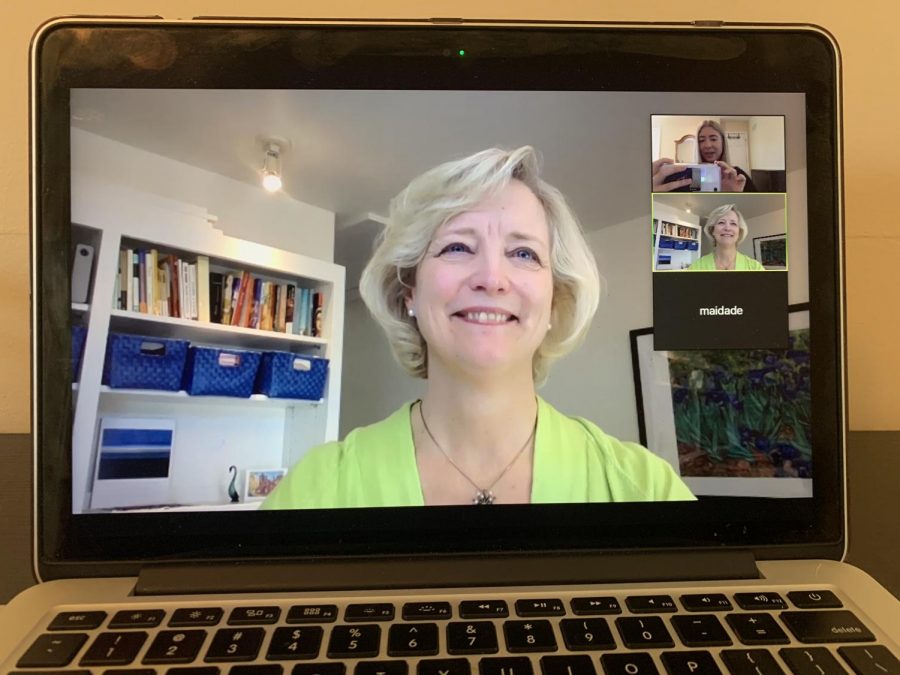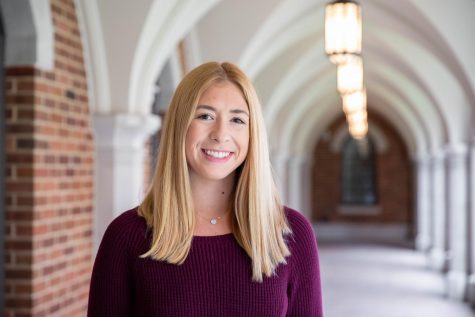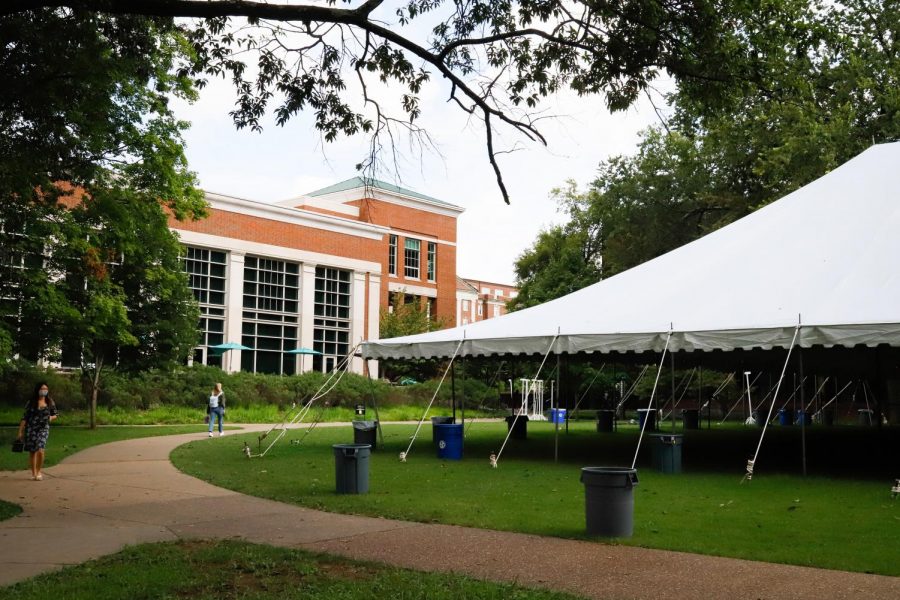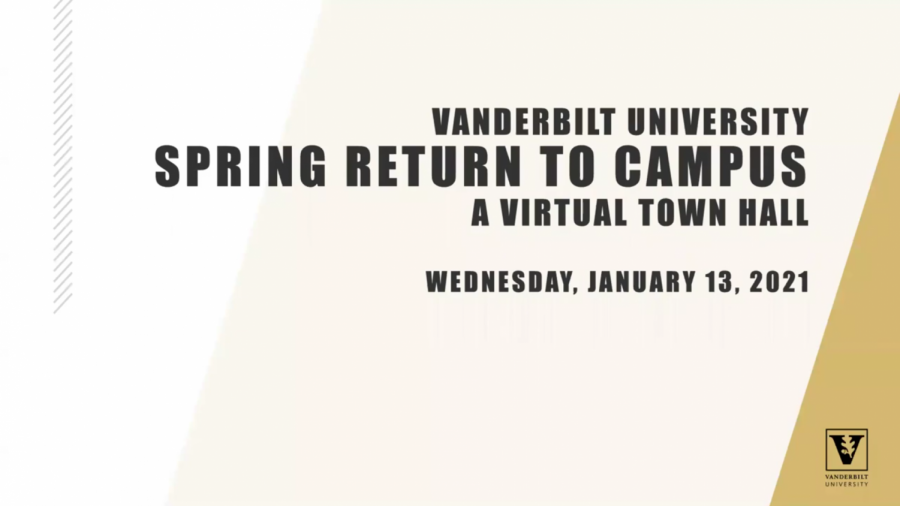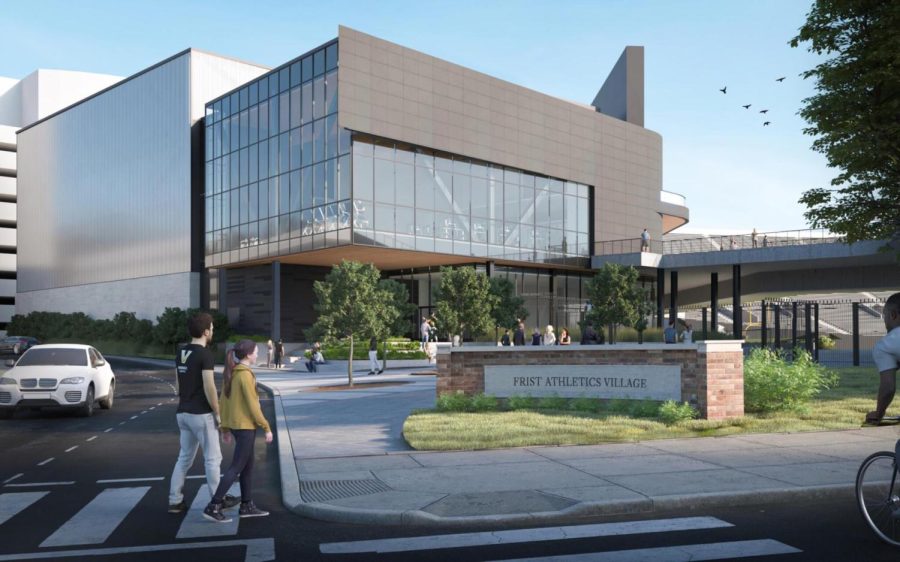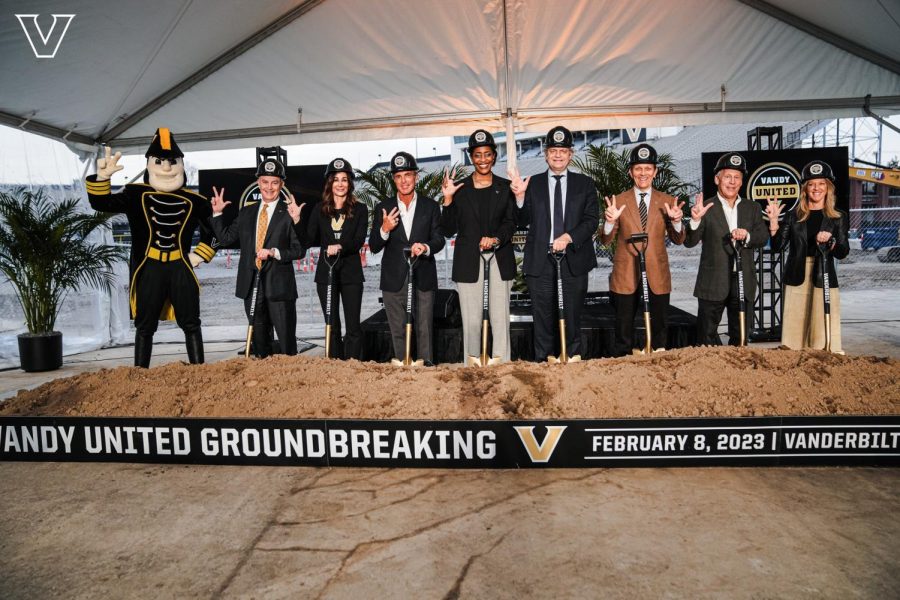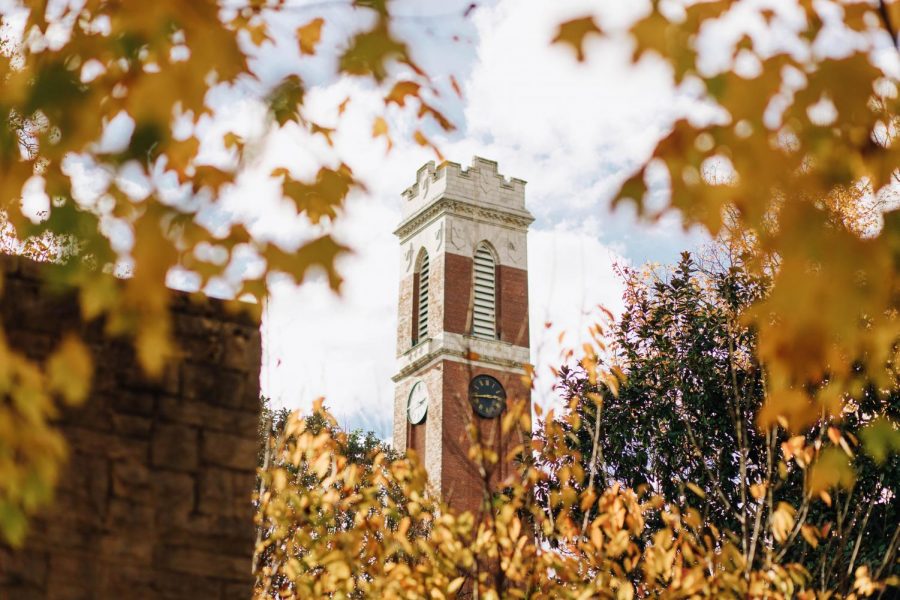The Hustler virtually sat down with Interim Chancellor Susan Wente Tuesday, April 21, right before the end of the Spring 2020 semester. Wente’s term ends June 30, and the current University of Chicago provost Daniel Diermeier takes over July 1. Wente will return to her previous role as Provost. As Interim Chancellor, Wente has led the university through unprecedented times given the spread of COVID-19, forced to make difficult decisions ranging from cancelling in-person classes mid-semester to how to answer economic questions like refunding room & board and helping balance the budget in light of an impending recession.
Vanderbilt Hustler: Life for everyone has changed so much with the coronavirus pandemic. What does your day-to-day look like right now?
Interim Chancellor Susan Wente: I’m observing the remote work period, so this is my home office. My day-to-day is mostly Zoom meetings, probably some days, 12 hours of Zoom meetings and calls. Every day there are new questions and new decisions that arise. Think even of yesterday when the governor decided what’s going to happen on a state-wide basis in terms of returning to work.
It’s just a very rapidly changing situation — the combination of both the COVID-19 pandemic and the economic slowdown. So I’m just addressing those topics in meetings with the vice chancellors. Of course, being both provost and interim chancellor means that this is a time when so much responsibility means even more work in that regard.
I’m also working leadership of different groups. I spoke to VSG last week, I spoke to the faculty Senate the week before that. I’m also working directly with the Board of Trust and the COVID-19 committee. There are many immediate considerations on a day-to-day basis, as well as trying to plan for next week, the next two weeks, the next month, the next semester, the next year. None of us are idle. I think actually there’s more work now.
Everyone is very committed. I have to basically tell people to get off Zoom and make sure they’re taking care of themselves.
It’s a difficult time to be anyone, but I’m sure it’s especially difficult being in charge of a university. How are you staying sane?
Well I don’t think I’ve done anything true and for myself for a long while. I think the way I’m staying sane is that I have a really great family. My husband, you know, he’ll deliver lunch to me up here. One of the silver linings of this is that our daughter who’s a junior in college, she goes to Tulane, she’s back with us doing her online classes. So I can have a pulse point for reality.
I have tried to say, on Saturday afternoon, I’m going to get off [work] from two to four, I’m going to go outside and pull some weeds. Then Sunday morning, okay, I’m not going to get on [and work] until 10 or 11. I’m going to go take a walk. So those are, you know, things I’m trying to try to build into the schedule.
Well, I hope you find some time to take care of yourself as things hopefully get into more of a routine. My next question is: what have you learned about Vanderbilt that you didn’t know before this challenge?
That’s a really good question. I would say two things.
One is that our community is remarkably resilient. I knew we were resilient before, but seeing the steadfast determination of our students, faculty and staff to try and find a way for us to do education given the current situation? Our resilience has never been tested at this level before.
The other thing that I’ve always known about our community, but I’m seeing in such new ways now is the fact that our community is incredibly caring.
In less than two months, so much happened in Nashville. When that tornado hit at the beginning of spring break, our community just rallied completely behind each other. And now, we are thinking about the impacts of the economic downturn. None of us have experienced maybe any of these things separately, but now we are experiencing all three at the same time.
What people have really focused on is, how do we take care of each other? And that’s really heartening. I am just so motivated by seeing our community take care of each other, whether it’s all the donors to the student hardship fund or VSG giving its funds to the hardship fund, whether it’s faculty, staff and students volunteering and innovating, making hand sanitizer or brainstorming ventilator designs or writing poems, wanting to be involved.
It’s the depth of caring and thinking about all parts of the community that challenges like this reveal and I’m just really, really proud of our Vanderbilt community.
Every university has experienced the COVID-19 crisis, every university has the economic impacts coming, but we’ve had extra tests on top of that. It’s proven us to be Commodores, in more ways than one.
In recent weeks, there have been various university department heads making it easier for current seniors to apply to 4+1 Master’s degree programs, for example by waiving the GRE requirement and extending application deadlines. Is Vanderbilt planning on growing its Master’s programs?
There have been some conversations, but nothing definitive has come forward for me to approve. Certainly we’ve been thinking about how we could offer more 4+1 opportunities, especially in this particular time when undergraduates might not have an answer for what to do next.
Graduate programs can decide individually whether to waive the GRE requirement. I made that decision as provost. Now, I’m kind of trying to think about what those plans should be even for juniors who might consider it. There are a lot of working groups right now, but our overall mission is figuring out how to take care of our people.
I saw you write that you’ve been in close contact with incoming Chancellor Daniel Diermeier, what has that transition been like? Are you two working together on decisions or is he taking over some things while you’re still in charge of others?
We’ve been very closely connected since a couple days before it was publicly announced that he would be the next chancellor. I have known him since he’s been provost of Chicago. Both UChicago and Vanderbilt are in the AAU, the American Association of Universities, and there are annual provost meetings. But there’s also a subgroup of R1 research universities, we call it the 10U provost group, it’s like our own private club.
Daniel and I have been part of that group, working together and I’ve known him from that. So that made the transition really straightforward for both of us.
In addition to being in close contact with me, he’s doing Zoom meetings with the deans, with the vice chancellors. I know he’s really looking forward to connecting more with students. In terms of the decisions we’re making, I’m keeping him closely advised. But he’s incredibly supportive and confident in the actions that we’re taking. And so the handoff will hopefully not even be a handoff because I’m continuing on as provost. We’re really doing this to ensure that he knows absolutely everything that’s going on.
He’s reading tons of things about Vanderbilt, listening in on meetings, but he’s really letting the current leadership team have the authority. But he’s been very supportive of everything that we’ve been doing.
There’s been some speculation over university decisions that have aligned with decisions incoming Chancellor Diermeier has made at UChicago. For example, in Arts and Science Dean John Geer’s words, Vanderbilt is making graduate programs ‘leaner and meaner.’ Can you speak to whether that’s been something he’s been involved in?
I don’t want to necessarily speak to what his priorities are going to be. I think he’s working on what big strategic initiatives to roll out, and I don’t want to steal that thunder.
I will say that all of us have been continually interested in elevating our support for graduate education and increasing excellence in graduate education. That includes responding to the realities across society and higher education in terms of graduate education, such as career opportunities and career development.
In my five years as provost, we’ve ensured that we have really great health insurance for our graduate students. We’ve also ensured that we’re focusing on them as they’re building their skill sets to be as competitive as possible. I think that the things that have been done are part of that overall mission in terms of ensuring that we’re investing the resources that we have in the most impactful way possible.
With how Vanderbilt is organized, the graduate school and graduate programs have a kind of decentralized government structure. There’s a central graduate school that provides central support to all of the 40-some Ph.D. programs, but their operational support comes from the Dean of the specific school or college. And sometimes within individual schools and colleges, that’s where you’ll see some reorganizations. For example, when we’re going to start new programs versus when we’re going to find new ways to approach graduate education in different areas.
Last thing about incoming Chancellor Diermeier: there was a lot of talk about how the Chancellor Search Advisory Committee found that the community’s number one priority in selecting the new chancellor is diversity. And there has been some criticism around the selection of incoming Chancellor Diermeier due to his identity, as he will be the ninth white male Chancellor of Vanderbilt. What do you think about that? Do you think that Vanderbilt is ready for a chancellor that isn’t a white man?
Well, where I sit right now, and where I was when that process was going on, I certainly don’t know precisely the search committee’s thinking in how they made their selection.
I think that they had a lot of feedback and input from the community that I would hope and trust that they took into account. From my own position, I’m going to continue to be an incredibly strong advocate for equity, diversity and inclusion. And I’m going to be an incredibly strong advocate for all of our underrepresented groups, in whatever support that they need. So that’s really what I can do to ensure the university continues to walk the walk and make sure that there are actions behind ensuring that we are creating opportunity.
I heard that you read the staff editorial that The Hustler put out recently about university disregard for transparency making it difficult for us to do our job as a student newspaper. What do you think about this? What do you think the role of a student newspaper is on a college campus?
I think in terms of the role of the student newspaper on campus, it’s a great opportunity for students who are interested in journalism and communications. It might be either a part of their career path or it might be something that they just have a really strong passion for.
It’s an experiential opportunity that is critical in terms of students having a growth opportunity, a learning opportunity, to really see if this is something they’re passionate about for the long term. I think it also provides a way for students to articulate and express ideas and thoughts and interpretations of what’s going on.
Years ago, Vanderbilt moved its student communications group, maybe in the ’60’s, into a separate organization to ensure its independence, to ensure freedom of the press. And we’ve kept that as part of those organizational principles.
In terms of the editorial, what I said at the VSG senate meeting was that I was surprised by it. And that I was hurt by it in some ways. I think you have to understand—you had just emailed me about meeting with me, we’re in the middle of dialogues about how and when to meet when I’m—I won’t show you my schedule for today.
I was like, okay, wait a minute. Is this coming out because I didn’t drop everything to talk to you immediately? I want to say that I think Dean Bandas, Dean Christiansen and all of the individuals that seem to be most connected to the work of The Hustler are so committed to the students. I think they also were kind of wondering what’s going on. What’s the struggle? I think that because of just some of the complexity of the issues and because of the complexity of our balancing, to fit with your timelines, we’ve had the communications office help support us with that.
And so I know that I’ve asked Vice Chancellor Steve Ertel and Associate Vice Chancellor Ian Morrison, and others, since the editorial came out, to dig in and find out how we can do better. Right? Because clearly there’s a need to rebuild trust and to rebuild partnership. But I frankly didn’t know that that trusted partnership had been damaged.
Thank you. I just want to make clear that the editorial was definitely not about planning this meeting, we had been discussing all year the difference in our relationship with administration. I can’t imagine how busy your schedule is and I’m really grateful that you were able to find time for me so soon. I’m sure it was no easy feat, I don’t know if this is your lunch hour or what, but—
It is! I’m having Diet Coke. I have a Kind Bar somewhere in the office too. And I know that the students, you guys are really busy too. It’s one of those things we think about quite a bit in terms of how much our students take on, and I know that can add in the same way to when you have deadlines and applications and other student organizations that you’re trying to manage too.
It’s definitely understandable that university administrators are really busy during this time. We were just trying to bring focus to what seemed to be an erosion of face-to-face conversations in favor of email statements, but I’m sure that you all have talked about that. We’re running out of time, so I’ll just finish up with one last question. What are you most looking forward to in the next year? Whether professionally or personally, what’s next for you?
So I am really excited to continue as provost. I’m very committed to being able to really intensely focus on my efforts on the academic mission, as I had for the prior five years.
I’m passionate about, I always call it, the power of higher education. It is what allowed me to make the steps that I’ve been able to make. I’m also incredibly passionate about the role of research universities.
I think that now more than ever, we have to double down on our investment in higher education and our investment in research so that we have future leaders who are going to go out and help find solutions to things we’re confronting and help support society.
On a more personal note, well, I told you I have a daughter who’s a junior, so I am really looking forward to her graduation in May of 2021. I’m looking forward to being able to have a celebratory family event that I hope my parents can attend, who are 81 and 85. And I hope my daughter’s uncles can attend too.
With so much uncertainty right now in the world, thinking about those personal connections and how we’re going to celebrate them in the future—because I am an optimist, we will—is really important.
Responses have been edited for clarity and length.

